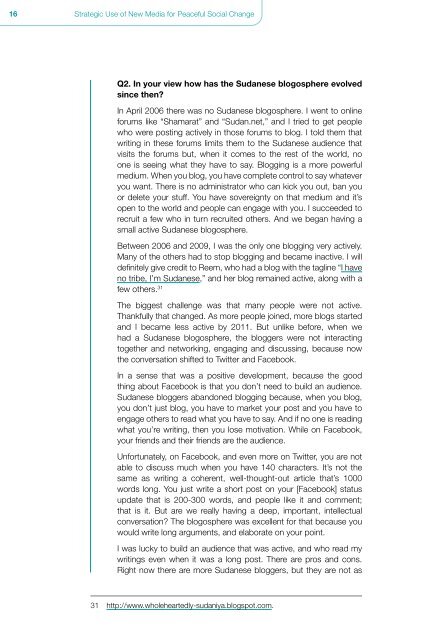Strategic Use New Media Peaceful Social Change
1Uy7LZ0
1Uy7LZ0
You also want an ePaper? Increase the reach of your titles
YUMPU automatically turns print PDFs into web optimized ePapers that Google loves.
16<br />
<strong>Strategic</strong> <strong>Use</strong> of <strong>New</strong> <strong>Media</strong> for <strong>Peaceful</strong> <strong>Social</strong> <strong>Change</strong><br />
Q2. In your view how has the Sudanese blogosphere evolved<br />
since then?<br />
In April 2006 there was no Sudanese blogosphere. I went to online<br />
forums like “Shamarat” and “Sudan.net,” and I tried to get people<br />
who were posting actively in those forums to blog. I told them that<br />
writing in these forums limits them to the Sudanese audience that<br />
visits the forums but, when it comes to the rest of the world, no<br />
one is seeing what they have to say. Blogging is a more powerful<br />
medium. When you blog, you have complete control to say whatever<br />
you want. There is no administrator who can kick you out, ban you<br />
or delete your stuff. You have sovereignty on that medium and it’s<br />
open to the world and people can engage with you. I succeeded to<br />
recruit a few who in turn recruited others. And we began having a<br />
small active Sudanese blogosphere.<br />
Between 2006 and 2009, I was the only one blogging very actively.<br />
Many of the others had to stop blogging and became inactive. I will<br />
definitely give credit to Reem, who had a blog with the tagline “I have<br />
no tribe, I’m Sudanese,” and her blog remained active, along with a<br />
few others. 31<br />
The biggest challenge was that many people were not active.<br />
Thankfully that changed. As more people joined, more blogs started<br />
and I became less active by 2011. But unlike before, when we<br />
had a Sudanese blogosphere, the bloggers were not interacting<br />
together and networking, engaging and discussing, because now<br />
the conversation shifted to Twitter and Facebook.<br />
In a sense that was a positive development, because the good<br />
thing about Facebook is that you don’t need to build an audience.<br />
Sudanese bloggers abandoned blogging because, when you blog,<br />
you don’t just blog, you have to market your post and you have to<br />
engage others to read what you have to say. And if no one is reading<br />
what you’re writing, then you lose motivation. While on Facebook,<br />
your friends and their friends are the audience.<br />
Unfortunately, on Facebook, and even more on Twitter, you are not<br />
able to discuss much when you have 140 characters. It’s not the<br />
same as writing a coherent, well-thought-out article that’s 1000<br />
words long. You just write a short post on your [Facebook] status<br />
update that is 200-300 words, and people like it and comment;<br />
that is it. But are we really having a deep, important, intellectual<br />
conversation? The blogosphere was excellent for that because you<br />
would write long arguments, and elaborate on your point.<br />
I was lucky to build an audience that was active, and who read my<br />
writings even when it was a long post. There are pros and cons.<br />
Right now there are more Sudanese bloggers, but they are not as<br />
31 http://www.wholeheartedly-sudaniya.blogspot.com.


